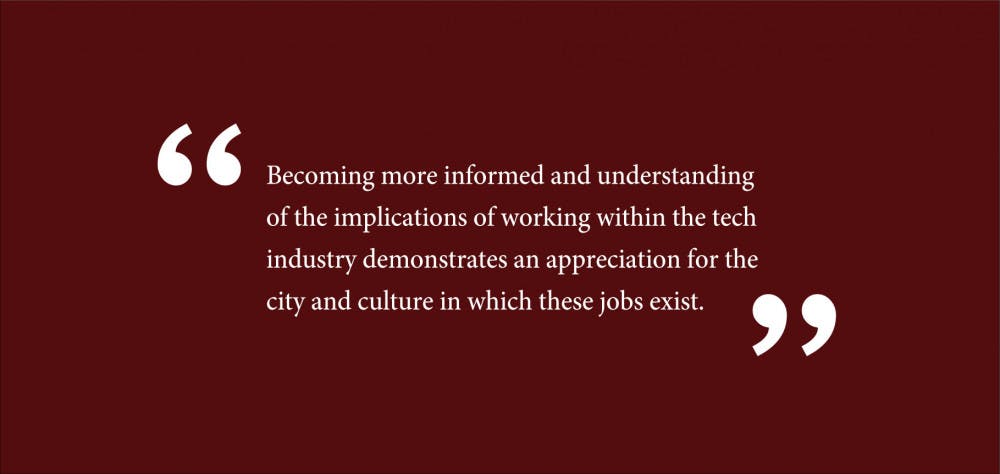Many Brown students concentrating in computer science hope to travel to Silicon Valley this summer to intern for a variety of tech companies and startups. But do these students realize the amount of space that they would take up by joining the tech industry in cities like San Francisco? The University should offer some mechanism to educate its CS students on the ethical implications of the tech boom.
Computer science is tied with economics as Brown’s most popular concentration, according to U.S. News and World Report, and the TV screens in the Center for Information Technology — Brown’s CS hub — often boast of how one in six Brown students concentrates in CS. That is a lot of web developers, programmers and software engineers who will enter the tech workforce after college. Many strive to land a coveted summer internship or a postgraduate gig at one of the multitudes of tech companies based in San Francisco and the surrounding Bay Area: Twitter, Uber, Dropbox, Yelp to name a few.
But what these students may not know — or perhaps do know, but try not to think about — is that in Bay Area cities, there is a battle between “techies” and the residents they are quickly displacing. Beginning in the 1990s, the Dot-Com Boom accelerated a process that has driven hordes of tech workers to San Francisco. As the demand for housing in the Bay Area increased, so did the cost of living. Without rent control laws to protect residents from eviction, native San Franciscans have been booted out as packs of technologically adept lemmings win ever-higher bidding wars. As of December 2018, the average cost of rent for a single-bedroom apartment in San Francisco is $3,693 a month — in the quaint, upscale neighborhood of Russian Hill, that figure skyrockets to $4,819 a month. Some of these former residents have now become a part of San Francisco’s homeless population. And it’s not just San Francisco suffering — surrounding areas like Oakland and Marin County watch their housing prices continue an inexorable climb.
Tech-driven gentrification in San Francisco and cities across the world has been an issue for years now, and sadly it shows no signs of stopping. As a result, educating tech employees on the ethical challenges that their work presents to maintaining an equitable and accessible urban environment is of paramount importance. Morally agnostic techies must recognize that the remarkable growth of their industry necessarily raises the stakes of their actions; as their stock price rises, so does their social responsibility. Presently, tech companies’ capacity for moral indifference can border on the absurd. In a central part of San Francisco, a newly built block of Uber executive offices rises directly over a strip of homeless residents. Uber, supposedly a socially conscious company, remains blind to the needs of homeless people living directly across the street. Indeed, tech companies must peer outside of their insular bubble and acknowledge their obligation to aid residents across all socioeconomic strata.
How does this relate to Brown students? Brown’s student body is comprised of more students from the top one percent than from the bottom 60 percent, a figure reported by the New York Times in 2017, and so it is easy for some students to underestimate or remain naive to the impacts that the industries we enter can have on communities. With this in mind, it becomes important to be aware of these effects; only then can we give more to the broader community than what we take. Even as a native San Franciscan myself, who has seen plenty of friends and neighbors driven out of the city, I can still strive to learn more about these issues. Without highlighting how the tech industry often tramples on a city’s native culture, companies can attempt to appropriate shared environments. For instance, in 2014 Airbnb and Dropbox employees tried to privately reserve a public park — a space that San Franciscans share equally.
Realizing that a CS summer internship in San Francisco — or other neighboring Silicon Valley cities — might contribute to gentrification is a painful conclusion to reach. However, becoming more informed and understanding of the implications of working within the tech industry demonstrates an appreciation for the city and culture in which these jobs exist, while strengthening a rocky relationship with long-term residents.
There are many ways in which CS students can learn more about the ethical complications created by the Dot-Com Boom. Students should consider researching which tech companies give back to the city of which they are a part — or those that do not — before applying to an internship. For example, Google has donated over $63 million to San Francisco to promote economic and educational opportunities as well as initiatives to reduce homelessness since 2014. Doing independent research can lead into a deep-dive of news reports, articles and studies about the ways in which the tech industry affects the makeup of Bay Area cities. Brown might even consider a sociology class on the ethics that stand at the intersection of technological progress, tech companies and gentrification; such a course could be a requirement within the CS concentration.
Whatever method of education it may be, it’s an important one to undertake out of a moral obligation to protect the places that the tech industry gentrifies every year. Brown CS students should come into San Francisco, Cupertino or wherever their internship brings them this summer aware that they are living in someone’s former home. Doing so will create a better and more equitable relationship between tech companies and the public.
Rachael Schmidt ’21 can be reached at rachael_schmidt@brown.edu. Please send responses to this opinion to letters@browndailyherald.com and other op-eds to opinions@browndailyherald.com.





